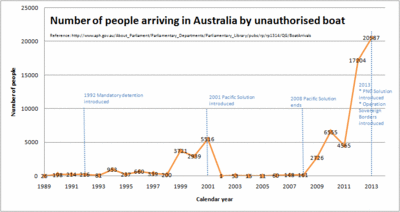
The Pacific Solution is the name given to the government of Australia's policy of transporting asylum seekers to detention centres on island nations in the Pacific Ocean, rather than allowing them to land on the Australian mainland. Initially implemented from 2001 to 2007, it had bipartisan support from the Coalition and Labor opposition at the time. The Pacific Solution consisted of three central strategies:
- Thousands of islands were excised from the Australian migration zone and Australian territory;
- The Australian Defence Force commenced Operation Relex to intercept vessels carrying asylum seekers (SIEVs);
- The asylum seekers were removed to detention centres in Nauru and on Manus Island, Papua New Guinea, while their refugee status was determined.
A number of pieces of legislation enabled this policy. The policy was developed by the Howard government in response to the Tampa affair in August 2001 and the Children Overboard affair,[1] and was implemented by Immigration Minister Philip Ruddock on 28 September before the 2001 federal election of 24 November.
The policy was largely dismantled in 2008 by the first Rudd government following the election of the Labor Party; Chris Evans, the Minister for Immigration and Citizenship described it as "a cynical, costly and ultimately unsuccessful exercise".[2]
In August 2012, the succeeding Gillard government (Labor) introduced a similar policy, reopening the Nauru and Manus detention centres for offshore processing.[3]
On 19 July 2013, newly returned Prime Minister Kevin Rudd, during his short-lived second term of office, announced that "asylum seekers who come here by boat without a visa will never be settled in Australia",[4] striking a Regional Resettlement Arrangement between Australia and Papua New Guinea,[5] colloquially known as the PNG Solution, to divert all "unauthorised maritime arrivals" to mandatory detention on Manus Island with no possibility of attaining Australian residency.[6]
The Operation Sovereign Borders policy took over from the Pacific Solution after the 2013 federal election, won by the Coalition. It commenced on 18 September 2013 under the new Abbott government.[7] On 31 March 2019, Operation Sovereign Borders reported that there were no people held in the detention centre on Nauru, which had been closed, and that the Manus centre had been officially closed on 31 October 2017.[8] However, on 30 September 2019 the total number of asylum seekers still in PNG and Nauru was 562 (separate numbers were not published), being housed in alternative accommodation.[9]
- ^ Philips, Janet (4 September 2012). "The 'Pacific Solution' revisited: a statistical guide to the asylum seeker caseloads on Nauru and Manus Island". Parliament of Australia. Archived from the original on 14 August 2020. Retrieved 25 July 2013.
- ^ "Flight from Nauru ends Pacific Solution". The Sydney Morning Herald. 8 February 2008. Archived from the original on 6 June 2014. Retrieved 26 August 2013.
- ^ "Govt embraces Pacific Solution measures". The Australian. 13 August 2012. Archived from the original on 13 August 2012. Retrieved 17 June 2013.
- ^ "Kevin Rudd to send asylum seekers who arrive by boat to Papua New Guinea". The Sydney Morning Herald. 19 July 2013. Archived from the original on 31 October 2017. Retrieved 26 August 2013.
- ^ "Regional resettlement arrangement between Australia and Papua New Guinea" (PDF). Australian Department of Foreign Affairs and Trade. Archived (PDF) from the original on 14 August 2020. Retrieved 26 August 2013.
- ^ "Regional Resettlement Arrangements" (PDF). Australian Department of Immigration and Citizenship. Archived from the original (PDF) on 9 October 2013. Retrieved 26 August 2013.
- ^ Liberal Party of Australia & The Nationals. "The Coalition's Operation Sovereign Borders Policy" (PDF). Archived from the original (PDF) on 3 March 2016. Retrieved 27 October 2013.
- ^ "Operation Sovereign Borders monthly update: March 2019 - Australian Border Force Newsroom". newsroom.abf.gov.au. Archived from the original on 14 August 2020. Retrieved 4 May 2019.
- ^ Australian Government. Senate. Legal And Constitutional Affairs Legislation Committee (21 October 2019). "Estimates". p. 76. Archived from the original on 27 April 2020. Retrieved 27 April 2020.
Proof Committee Hansard
